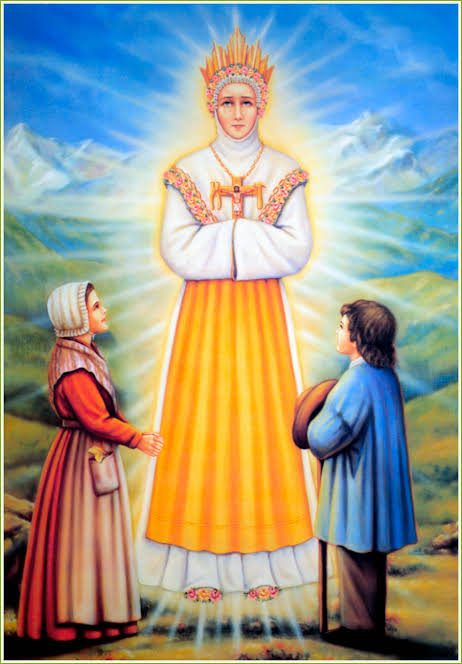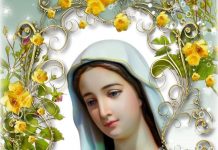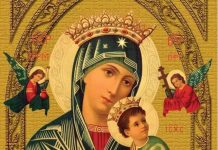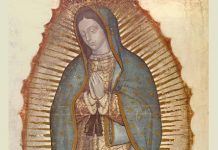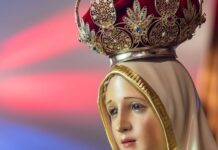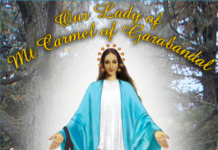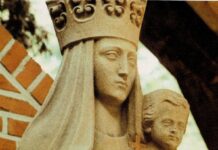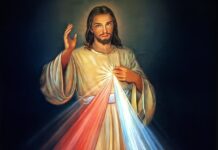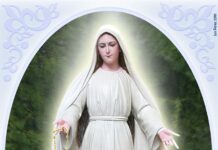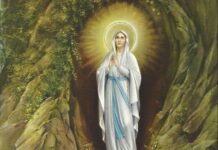Near this little fountain the two children layed down on the grass and fell asleep. How long their slumber lasted is not certain – half an hour perhaps, or three quarters of an hour or possibly more. In any case Melanie suddenly awoke and called Maximin: “Memin, Memin, let us go and find our cows, I cannot see them anywhere.”  Of course, being at the bottom of the little ravine, they could not see the meadow where they had left them. Quickly they climbed the slope opposite Mount Gargas (hence they were standing on what is now the esplanade in front of the basilica). Turning around they could view the entire alpine pasture land and were greatly relieved to see that their cows had remained where they had been left, peaceably chewing the cud. Reassured, Melanie began to redescend towards the dried-up fountain to recover her little sack of provisions before once again watering the cows. Half-way down the grassy slope she paused immobilized, frozen with fear. “Memin”, she called out, “look at that great light over there”. “Where is it?”, the boy replied, as he ran and stood at her side. (At the place of the Apparition two statues represent the children on the slope of the ravine, in the first stage of the Event.) At the very spot where they had slept was a globe of fire, as if, in the children’s words, “the sun had fallen there”. The light swirled, then grew in size and, opening, disclosed within it a woman, seated, her head in her hands, her elbows on her knees, in the attitude of one oppressed with grief. Melanie, in her fright, raised her hands and dropped her shepherd’s staff. Maximin thought only of defending himself. “Keep your stick”, he said to her, “I will keep mine and will give it a good whack if it does anything to us” …Even after she conversed with them, the children could not identify their heavenly Visitor. They would simply call her “the Beautiful Lady”.
Of course, being at the bottom of the little ravine, they could not see the meadow where they had left them. Quickly they climbed the slope opposite Mount Gargas (hence they were standing on what is now the esplanade in front of the basilica). Turning around they could view the entire alpine pasture land and were greatly relieved to see that their cows had remained where they had been left, peaceably chewing the cud. Reassured, Melanie began to redescend towards the dried-up fountain to recover her little sack of provisions before once again watering the cows. Half-way down the grassy slope she paused immobilized, frozen with fear. “Memin”, she called out, “look at that great light over there”. “Where is it?”, the boy replied, as he ran and stood at her side. (At the place of the Apparition two statues represent the children on the slope of the ravine, in the first stage of the Event.) At the very spot where they had slept was a globe of fire, as if, in the children’s words, “the sun had fallen there”. The light swirled, then grew in size and, opening, disclosed within it a woman, seated, her head in her hands, her elbows on her knees, in the attitude of one oppressed with grief. Melanie, in her fright, raised her hands and dropped her shepherd’s staff. Maximin thought only of defending himself. “Keep your stick”, he said to her, “I will keep mine and will give it a good whack if it does anything to us” …Even after she conversed with them, the children could not identify their heavenly Visitor. They would simply call her “the Beautiful Lady”.
The Beautiful Lady
The beautiful Lady now stood up while the children remained transfixed where they were. She said to them in French: “Come near, my children, be not afraid. I am here to tell you great news”. Fully reassured by these words the children hurried to meet her. Her voice, they said, was like music. They approached so near her that, as they later expressed it, another person could not have passed between them and her. The Lady also took a few steps towards them. They looked at her and noticed that she did not cease weeping all the time she spoke to them. As Maximin put it, “She was like a mama whom her own children had beaten and who had escaped to the mountain to weep.” The beautiful Lady was tall and seemed to be made of light. She was dressed like women of the region with a long dress, an apron nearly as long as the dress, a shawl that crossed over her breast and was knotted in the back, and a cap or bonnet similar to the ones worn by peasant women. Roses crowned her head while another wreath of roses adorned the edges of her white shawl and a third garland surrounded her shoes. Over her brow shone a light in the form of a diadem. On her shoulders shone a heavy chain and from a smaller golden chain hung a resplendent crucifix with a hammer and pincers placed on each side of the Cross, a little beyond the nailed hands.
The Message
The unknown Lady now spoke to the children. “We were drinking her words”, they would say later, adding, “she wept all the time she spoke to us”. “Come near, my children, be not afraid; I am here to tell you great news.  “If my people will not submit, I shall be forced to let fall the arm of my Son. It is so strong, so heavy, that I can no longer withhold it. “For how long a time do I suffer for you! If I would not have my Son abandon you, I am compelled to pray to him without ceasing; and as to you, you take not heed of it. “However much you pray, however much you do, you will never recompense the pains I have taken for you. “Six days I have given you to labor, the seventh I have kept for myself; and they will not give it to me. It is this which makes the arm of my Son so heavy. “Those who drive the carts cannot swear without introducing the name of my Son. These are the two things which make the arm of my Son so heavy. “If the harvest is spoilt, it is all on your account. I gave you warning last year with the potatoes (‘pommes de terre’) but you did not heed it. On the contrary, when you found the potatoes spoilt, you swore, you took the name of my Son in vain. They will continue to decay, so that by Christmas there will be none left.” The French expression “pommes de terre” intrigued Melanie. In the local dialect the word for potatoes was “las truffas”, whereas “pommes” for Melanie meant the fruit of the apple tree. Hence she instinctively turned towards Maximin to ask for an explanation, but the Beautiful Lady forestalled her. “Ah, my children, you do not understand? Well, wait, I shall say it otherwise”. And she continued her discourse in the local dialect of their region. “If you have wheat, it is no good to sow it; all you sow the insects will eat, and what comes up will fall into dust when you thresh it.” “There will come a great famine. Before the famine comes, the children under seven years of age will be seized with trembling and will die in the hands of those who hold them; the others will do penance by the famine. The walnuts will become bad, and the grapes will rot.” Here the Beautiful Lady addressed the children separately, confiding to each a secret. She spoke first to Maximin, and though the little shepherd did not perceive that her tone of voice had changed, Melanie at his side could not hear a word, though she still saw the Beautiful Lady’s lips moving. Then came Melanie’s turn to receive her secret under like conditions. Both secrets were given in French. Again addressing the two children in the idiom familiar to them, the Lady continued: “If they are converted, the stones and rocks will change into mounds of wheat, and the potatoes will be self-sown in the land. “Do you say your prayers well, my children?”, she asked the shepherds. Both answered with complete frankness: “Not very well, Madam”. “Ah, my children”, she exhorted them, “you must be sure to say them well morning and evening. When you cannot do better, say at least an Our Father and a Hail Mary; but when you have time, say more.” “There are none who go to Mass except a few aged women. The rest work on Sunday all summer; then in the winter, when they know not what to do, they go to Mass only to mock at religion. During Lent, they go to the meat-market like dogs.” “Have you never seen wheat that is spoilt, my children?”, the Beautiful Lady then asked them. “No, Madam”, they replied.
“If my people will not submit, I shall be forced to let fall the arm of my Son. It is so strong, so heavy, that I can no longer withhold it. “For how long a time do I suffer for you! If I would not have my Son abandon you, I am compelled to pray to him without ceasing; and as to you, you take not heed of it. “However much you pray, however much you do, you will never recompense the pains I have taken for you. “Six days I have given you to labor, the seventh I have kept for myself; and they will not give it to me. It is this which makes the arm of my Son so heavy. “Those who drive the carts cannot swear without introducing the name of my Son. These are the two things which make the arm of my Son so heavy. “If the harvest is spoilt, it is all on your account. I gave you warning last year with the potatoes (‘pommes de terre’) but you did not heed it. On the contrary, when you found the potatoes spoilt, you swore, you took the name of my Son in vain. They will continue to decay, so that by Christmas there will be none left.” The French expression “pommes de terre” intrigued Melanie. In the local dialect the word for potatoes was “las truffas”, whereas “pommes” for Melanie meant the fruit of the apple tree. Hence she instinctively turned towards Maximin to ask for an explanation, but the Beautiful Lady forestalled her. “Ah, my children, you do not understand? Well, wait, I shall say it otherwise”. And she continued her discourse in the local dialect of their region. “If you have wheat, it is no good to sow it; all you sow the insects will eat, and what comes up will fall into dust when you thresh it.” “There will come a great famine. Before the famine comes, the children under seven years of age will be seized with trembling and will die in the hands of those who hold them; the others will do penance by the famine. The walnuts will become bad, and the grapes will rot.” Here the Beautiful Lady addressed the children separately, confiding to each a secret. She spoke first to Maximin, and though the little shepherd did not perceive that her tone of voice had changed, Melanie at his side could not hear a word, though she still saw the Beautiful Lady’s lips moving. Then came Melanie’s turn to receive her secret under like conditions. Both secrets were given in French. Again addressing the two children in the idiom familiar to them, the Lady continued: “If they are converted, the stones and rocks will change into mounds of wheat, and the potatoes will be self-sown in the land. “Do you say your prayers well, my children?”, she asked the shepherds. Both answered with complete frankness: “Not very well, Madam”. “Ah, my children”, she exhorted them, “you must be sure to say them well morning and evening. When you cannot do better, say at least an Our Father and a Hail Mary; but when you have time, say more.” “There are none who go to Mass except a few aged women. The rest work on Sunday all summer; then in the winter, when they know not what to do, they go to Mass only to mock at religion. During Lent, they go to the meat-market like dogs.” “Have you never seen wheat that is spoilt, my children?”, the Beautiful Lady then asked them. “No, Madam”, they replied.  “But you, my child”, she insisted, addressing the little boy in particular, “you must surely have seen some once when you were at the farm of Coin with your father. (Coin was a hamlet near the town of Corps). The owner of the field told your father to go and see his ruined wheat. You went together. You took two or three ears of wheat into your hands and rubbed them, and they fell into dust. Then you continued home. When you were still half an hour’s distance from Corps, your father gave you a piece of bread and said to you: ‘Here, my child, eat some bread this year at least; I don’t know who will eat any next year, if the wheat goes on like that’”. Confronted with such precise details, Maximin eagerly replied: “Oh yes, Madam, I remember now; just at this moment I did not remember”. Then the Lady, again speaking French as at the beginning of her discourse and when giving the secrets, said to them: “Well, my children, you will make this known to all my people.” Now she turned slightly to her left, passed in front of the children, crossed the brook Sezia, stepping on stones emerging from it, and when she was about ten feet from the opposite bank repeated her final request, without turning around or stopping: “Well, my children, you will make this well known to all my people.” These were her last words. Meanwhile the two witnesses were still standing motionless at the spot where the conversation had taken place, when suddenly they realized that the heavenly Visitor was already some steps away from them. In their eagerness to join her again, they ran across the brook and were with her in a moment. Thus, in the company of Maximin and Melanie, the Lady moved along, gliding over the tips of the grass without touching it, until she reached the top of the hillock where the children, after their sleep, had gone to look after their cows. Melanie preceded her by a few steps, and Maximin was at her right. On reaching the summit the Lady paused for a few seconds, then slowly rose up to a height of a meter and a half. She remained suspended in the air for a moment, raised her eyes to Heaven, then glanced in the direction of the southeast. At that moment, Melanie, who had been standing at the left of the Lady, came in front in order to see her better. Only then did she notice that the celestial Visitor had ceased weeping, although her features remained very sad. The radiant vision now began to disappear. “We saw her head no more, then the rest of the body no more; she seemed to melt away. There remained a great light”, related Maximin, “as well as the roses at her feet which I tried to catch with my hands; but there was nothing more”. “We looked for a long time”, added Melanie, “to see if we could not have another glimpse of her”, but the Beautiful Lady had disappeared forever. The little shepherdess then remarked to her companion: “Perhaps it was a great Saint”. “If we had known it was a great Saint”, said Maximin, “we would have asked her to take us with her”.
“But you, my child”, she insisted, addressing the little boy in particular, “you must surely have seen some once when you were at the farm of Coin with your father. (Coin was a hamlet near the town of Corps). The owner of the field told your father to go and see his ruined wheat. You went together. You took two or three ears of wheat into your hands and rubbed them, and they fell into dust. Then you continued home. When you were still half an hour’s distance from Corps, your father gave you a piece of bread and said to you: ‘Here, my child, eat some bread this year at least; I don’t know who will eat any next year, if the wheat goes on like that’”. Confronted with such precise details, Maximin eagerly replied: “Oh yes, Madam, I remember now; just at this moment I did not remember”. Then the Lady, again speaking French as at the beginning of her discourse and when giving the secrets, said to them: “Well, my children, you will make this known to all my people.” Now she turned slightly to her left, passed in front of the children, crossed the brook Sezia, stepping on stones emerging from it, and when she was about ten feet from the opposite bank repeated her final request, without turning around or stopping: “Well, my children, you will make this well known to all my people.” These were her last words. Meanwhile the two witnesses were still standing motionless at the spot where the conversation had taken place, when suddenly they realized that the heavenly Visitor was already some steps away from them. In their eagerness to join her again, they ran across the brook and were with her in a moment. Thus, in the company of Maximin and Melanie, the Lady moved along, gliding over the tips of the grass without touching it, until she reached the top of the hillock where the children, after their sleep, had gone to look after their cows. Melanie preceded her by a few steps, and Maximin was at her right. On reaching the summit the Lady paused for a few seconds, then slowly rose up to a height of a meter and a half. She remained suspended in the air for a moment, raised her eyes to Heaven, then glanced in the direction of the southeast. At that moment, Melanie, who had been standing at the left of the Lady, came in front in order to see her better. Only then did she notice that the celestial Visitor had ceased weeping, although her features remained very sad. The radiant vision now began to disappear. “We saw her head no more, then the rest of the body no more; she seemed to melt away. There remained a great light”, related Maximin, “as well as the roses at her feet which I tried to catch with my hands; but there was nothing more”. “We looked for a long time”, added Melanie, “to see if we could not have another glimpse of her”, but the Beautiful Lady had disappeared forever. The little shepherdess then remarked to her companion: “Perhaps it was a great Saint”. “If we had known it was a great Saint”, said Maximin, “we would have asked her to take us with her”.
The Great News Spreads
At dusk, a little earlier than usual, the children brought back their herds to the hamlet of Ablandins nestling on the mountainside below. Pierre Selme had been impatiently awaiting Maximin’s return to the farm house. “Well, Memin”, he asked him, “why did you not come back to me in my field, as I told you?” “Oh”, Maximin replied, “You do not know what happened? We found by the spring a beautiful lady who entertained us a long time and talked with Melanie and myself. At first I was afraid and did not dare to go and fetch my bread which was near her, but she said to us: ‘Come near, my children, do not be afraid, I am here to tell you great news’”. The boy then related the story of the Apparition, hardly pausing for breath. He was very surprised that the people of the valley had not noticed the bright light in the ravine. He then scampered lightheartedly over to the home of Melanie’s master, Baptiste Pra. The girl, busy in the stable, had as yet said nothing. Maximin, more communicative, spoke at once to the assembled Pra family about the Beautiful Lady. He was immediately surrounded and questioned. On hearing the story, the old mother of Baptiste Pra began to cry, and with the intuition her simple faith gave her exclaimed: “This beautiful Lady can be none other than the Blessed Virgin”. The others were not so sure and waited for Melanie. As she did not hurry, her mistress, old Mother Pra, ran to the cowbarn to fetch her. “Come quickly and tell us what you saw with Maximin”. “I saw as he did,” the girl replied, “and since he has told you, you must know it by now.” But all insisted, so back in the kitchen of the humble cottage she stood before them and related, for the first time, the wonderful event. All were amazed to hear both children, while reciting the Lady’s discourse, speaking French fluently, for that same morning neither of them knew anything or very little of that language. The pious old grandmother, more and more moved, repeated her conviction: “She is certainly the Blessed Virgin, for there is no other person in Heaven whose Son governs”. Then she turned reproachfully to her young son James: “You have heard what the Blessed Virgin said – go now and work again on Sunday!” “Bah”, came the retort, “you will make me believe that this little one has seen the Blessed Virgin, she who does not even say her prayers!” “But that night”, declared Melanie later, “I remained a long time on my knees although I hardly knew any prayers by heart”. It was eventually decided that this affair was something to be submitted to the Church. Hence, first thing in the morning, the two children descended to the village of La Salette to tell their story to the pastor, Father Jacques Perrin. A knock at the rectory door brought the priest’s housekeeper, a kind but inquisitive spinster. They said they must see the priest. Must they, indeed? And why? They had something of great importance to tell him. They could tell it to her, Francoise insisted; it was the same thing. Seeing that she was immovable, the children began their recital. Father Perrin, in the next room, heard them and as they continued, he lay down his pen (he was writing his sermon). For a while he sat motionless, then moved noiselessly toward the kitchen. When the account was complete, he stepped into the kitchen and with tears in his eyes said to the children: “How fortunate you are, my children, for it must have been the Blessed Virgin whom you saw!” It was time for Mass and when Father Perrin mounted the pulpit he began telling the people of the children’s strange experience on the mountain. But his voice was choked with emotion and his words were unintelligible save by someone who already knew the story. The people looked at each other, mystified. But there was one who understood him – Monsieur Peytard, the mayor of La Salette. In the afternoon Peytard was on his way to the hamlet of Ablandins. He did not advertise his real purpose but would casually drop in at the Pra’s house for a friendly visit. He spoke to Melanie and asked to hear again the story she had been telling (by this time Maximin was already back in Corps). When she was through, he said: “Be careful, my child, to add or suppress nothing.” “I have said everything the beautiful lady told me to say”, was her reply. Then he began to cross-examine her mercilessly, passing back and forth from threats to bribes. It was fruitless. He could not shake Melanie or get her to vary her account by a word or persuade her to say no more about it. The lengthy interview, however, did induce Pra to abandon his attitude of disbelief. There must be something to this affair. He must put the story down on paper, with the help of his friends Selme and Moussier. So, that evening Melanie was made to tell the story one more time, but now very slowly, so that Pra could get every word down on paper. How right was his instinct in giving documentary form, as quickly as possible, to what the unforgettable voice had said on the mountain just the day before! Monday morning M. Peytard descended to Corps to question Maximin. He returned to La Salette, won over by the amazing self-assurance, candor and tenacity of the boy. His account accorded perfectly, down to the last detail, with that of Melanie. Now the news spread rapidly. Pilgrims, unbelievers, skeptics, took turn in questioning the two young witnesses, trying in every way to cause them to contradict each other. Among them were journalists, delegates from the civil authorities, but most importantly ecclesiastics commissioned by Monseigneur de Bruillard, the bishop of Grenoble. For, according to Canon Law, the ultimate decision rested with the bishop in whose diocese a reported miracle or apparition had taken place.


